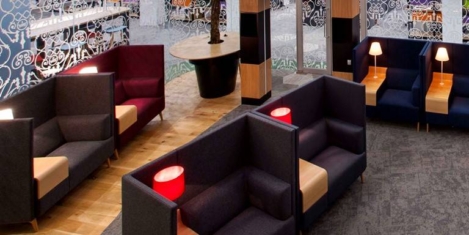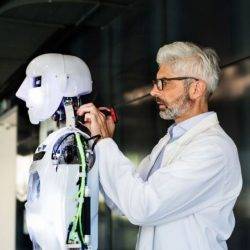January 11, 2018
Promotion: Humanscale launch Quickstand Eco to lead next generation of sit/stand workstations
 Humanscale, has launched its next generation of portable sit/stand products. The QuickStand Eco claims to unite function and sustainability at an accessible price point to improve employee performance and encourage a more active workplace. This new height-adjustable solution is sleeker, easier to install and comprises more sustainable materials than ever before. QuickStand Eco utilises minimal parts and pieces, limiting it’s environmental footprint and maintaining a minimal, clean aesthetic. It features simple setup and is easy to transport, making it a flexible option for both corporate and home offices. The instant height adjustability encourages users to sit and stand more often and the product can also be integrated with Humanscale’s OfficeIQ software, which sends periodic alerts when it is time to adjust one’s position.
Humanscale, has launched its next generation of portable sit/stand products. The QuickStand Eco claims to unite function and sustainability at an accessible price point to improve employee performance and encourage a more active workplace. This new height-adjustable solution is sleeker, easier to install and comprises more sustainable materials than ever before. QuickStand Eco utilises minimal parts and pieces, limiting it’s environmental footprint and maintaining a minimal, clean aesthetic. It features simple setup and is easy to transport, making it a flexible option for both corporate and home offices. The instant height adjustability encourages users to sit and stand more often and the product can also be integrated with Humanscale’s OfficeIQ software, which sends periodic alerts when it is time to adjust one’s position.







 The proportion of flexible space within occupier portfolios will continue to increase in 2018; a growing adoption of technology will redefine buildings, workplaces and portfolios; and it will be a year of decision for many businesses regarding Brexit. These are among the ‘UK Property Predictions 2018’ report from JLL which covers a range of different topics, with a particular focus on UK corporate occupiers. The report claims that traditional static portfolio concepts are being redesigned to incorporate new formats of space, co-working and a more fluid and diverse range of space options that support creativity, innovation and collaboration.
The proportion of flexible space within occupier portfolios will continue to increase in 2018; a growing adoption of technology will redefine buildings, workplaces and portfolios; and it will be a year of decision for many businesses regarding Brexit. These are among the ‘UK Property Predictions 2018’ report from JLL which covers a range of different topics, with a particular focus on UK corporate occupiers. The report claims that traditional static portfolio concepts are being redesigned to incorporate new formats of space, co-working and a more fluid and diverse range of space options that support creativity, innovation and collaboration. 








 A new survey claims that the ability to accommodate agile working into their life is important, with those who prefer to work agile claiming they would sacrifice an average of 16 percent of their annual salary for the opportunity.In addition to this, 86 percent stated they would even change jobs to accommodate their preference. The report into recruiting for an agile workforce suggests that despite being a relatively new concept, over half surveyed were familiar with it and over 22 percent of those had worked in an agile environment for over two years. However, recruiters claim less than half of the roles they’re working on offer agile, finding it’s most prevalent in the IT sector. The study reveals both recruiters and candidates believe the key attributes for success in agile are being flexible, organised and hardworking. Interestingly, the majority of recruiters believe these are required in advance and cannot be developed on the job. Meanwhile, social qualities (like being introverted or outgoing) or being easy going are less important.
A new survey claims that the ability to accommodate agile working into their life is important, with those who prefer to work agile claiming they would sacrifice an average of 16 percent of their annual salary for the opportunity.In addition to this, 86 percent stated they would even change jobs to accommodate their preference. The report into recruiting for an agile workforce suggests that despite being a relatively new concept, over half surveyed were familiar with it and over 22 percent of those had worked in an agile environment for over two years. However, recruiters claim less than half of the roles they’re working on offer agile, finding it’s most prevalent in the IT sector. The study reveals both recruiters and candidates believe the key attributes for success in agile are being flexible, organised and hardworking. Interestingly, the majority of recruiters believe these are required in advance and cannot be developed on the job. Meanwhile, social qualities (like being introverted or outgoing) or being easy going are less important. Impostor syndrome (where we feel like we are ‘faking it’ at the job we are doing) could be holding back many senior executives from realising their potential – according to new research from Dropbox on the state of teamwork within businesses in the UK. The research, which marks the launch of a new study, conducted in conjunction with philosophers at The School of Life reveals that 80 percent of Chief Executive Officers (CEOs) and 81 percent of Managing Directors say they sometimes feel ‘out of their depth’ and as if they are ‘struggling’ in their role. The research investigates behaviours in business that are limiting to great teamwork. Being averse to disagreeing with others – often seen as a typically British trait – is identified as a key issue holding back teams within British business. The data also claims that two thirds of British workers (69 percent) say that they aren’t comfortable disagreeing with others at work.
Impostor syndrome (where we feel like we are ‘faking it’ at the job we are doing) could be holding back many senior executives from realising their potential – according to new research from Dropbox on the state of teamwork within businesses in the UK. The research, which marks the launch of a new study, conducted in conjunction with philosophers at The School of Life reveals that 80 percent of Chief Executive Officers (CEOs) and 81 percent of Managing Directors say they sometimes feel ‘out of their depth’ and as if they are ‘struggling’ in their role. The research investigates behaviours in business that are limiting to great teamwork. Being averse to disagreeing with others – often seen as a typically British trait – is identified as a key issue holding back teams within British business. The data also claims that two thirds of British workers (69 percent) say that they aren’t comfortable disagreeing with others at work.















December 7, 2017
What P T Barnum can teach us about the facilities management circus
by Mark Eltringham • Architecture, Comment, Facilities management, Workplace
More →